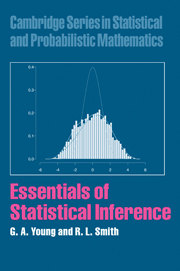Book contents
2 - Decision theory
Published online by Cambridge University Press: 06 July 2010
Summary
In this chapter we give an account of the main ideas of decision theory. Our motivation for beginning our account of statistical inference here is simple. As we have noted, decision theory requires formal specification of all elements of an inference problem, so starting with a discussion of decision theory allows us to set up notation and basic ideas that run through the remainder of the book in a formal but easy manner. In later chapters, we will develop the specific techniques of statistical inference that are central to the three paradigms of inference. In many cases these techniques can be seen as involving the removal of certain elements of the decision theory structure, or focus on particular elements of that structure.
Central to decision theory is the notion of a set of decision rules for an inference problem. Comparison of different decision rules is based on examination of the risk functions of the rules. The risk function describes the expected loss in use of the rule, under hypothetical repetition of the sampling experiment giving rise to the data x, as a function of the parameter of interest. Identification of an optimal rule requires introduction of fundamental principles for discrimination between rules, in particular the minimax and Bayes principles.
- Type
- Chapter
- Information
- Essentials of Statistical Inference , pp. 4 - 21Publisher: Cambridge University PressPrint publication year: 2005

